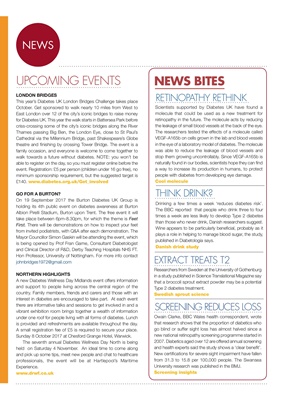
NEWS
SCREENING REDUCES LOSS
Drinking a few times a week 'reduces diabetes risk'.
The BBC reported that people who drink three to four
times a week are less likely to develop Type 2 diabetes
than those who never drink, Danish researchers suggest.
Wine appears to be particularly beneficial, probably as it
plays a role in helping to manage blood sugar, the study,
published in Diabetologia says.
Danish drink study
THINK DRINK?
Researchers from Sweden at the University of Gothenburg
in a study published in Science Translational Magazine say
that a broccoli sprout extract powder may be a potential
Type 2 diabetes treatment.
Swedish sprout science
EXTRACT TREATS T2
Owain Clarke, BBC Wales health correspondent, wrote
that research shows that the proportion of diabetics who
go blind or suffer sight loss has almost halved since a
new national retinopathy screening programme started in
2007. Diabetics aged over 12 are offered annual screening
and health experts said the study shows a 'clear benefit'.
New certifications for severe sight impairment have fallen
from 31.3 to 15.8 per 100,000 people. The Swansea
University research was published in the BMJ.
Screening insights
NEWS BITES
UPCOMING EVENTS
LONDON BRIDGES
This year's Diabetes UK London Bridges Challenge takes place
October. Get sponsored to walk nearly 10 miles from West to
East London over 12 the city's iconic bridges to raise money for
Diabetes UK. This year the walk starts in Battersea Park before
criss-crossing some of the city's iconic bridges along the River
Thames passing Big Ben, the London Eye, close to St Paul's
Cathedral via the Millennium Bridge, pat Shakespeare's Globe
theatre and finishing by crossing Tower Bridge. The event is a
family occasion, and everyone is welcome to come together to
walk towards a future without diabetes. NOTE: you won't be
able to register on the day, so you must register online before the
event. Registration: £5 per person (children under 16 go free), no
minimum sponsorship requirement, but the suggested target is
£140. www.diabetes.org.uk/get_involved
GO FOR A BURTON?
On 19 September 2017 the Burton Diabetes UK Group is
holding its 4th public event on diabetes awareness at Burton
Albion Pirelli Stadium, Burton upon Trent. The free event it will
take place between 6pm-8.30pm, for which the theme is Feet
First. There will be demonstrations on how to inspect your feet
from invited podiatrists, with Q&A after each demonstration. The
Mayor Councillor Simon Gaskin will be attending the event, which
is being opened by Prof Fran Game, Consultant Diabetologist
and Clinical Director of johnbridges1972@gmail.comospitals NHS FT.
Hon Professor, University of Nottingham. For more info contact
johnbridges1972@gmail.com
NORTHERN HIGHLIGHTS
A new Diabetes Wellness Day Midlands event offers information
and support to people living across the central region of the
country. Family members, friends and carers and those with an
interest in diabetes are encouraged to take part. At each event
there are informative talks and sessions to get involved in and
a vibrant exhibition room bring together a wealth of information
under one roof for people living with all forms of diabetes.
Lunch and refreshments provided throughout the day. A small
registration fee of £5 is required to secure your place. Sunday 8
October 2017 at Chesford Grange Hotel, Kenilworth, Warwick.
The seventh annual Diabetes Wellness Day North is being held on
Saturday 4 November. An ideal time to come along and pick up
some tips, meet new people and chat to healthcare professionals,
the event will be at Hartlepool's Maritime Experience.
www.drwf.co.uk
Scientists supported by Diabetes UK have found a
molecule that could be used as a new treatment for
retinopathy in the future. The molecule acts by reducing
the leakage of small blood vessels at the back of the eye.
The researchers tested the effects of a molecule called
VEGF-A165b on cells grown in the lab and blood vessels
in the eye of a laboratory model of diabetes. The molecule
was able to reduce the leakage of blood vessels and
stop them growing uncontrollably. Since VEGF-A165b is
naturally found in our bodies, scientists hope they can find
a way to increase its production in humans, to protect
people with diabetes from developing eye damage.
Cool molecule
RETINOPATHY RETHINK